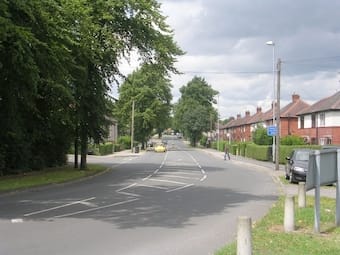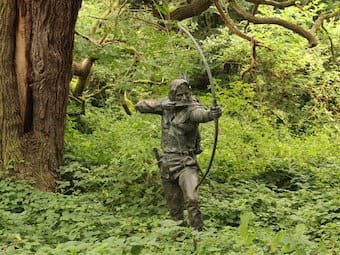George-a-Green Road in Lupset, a short step to the west of Wakefield. Well into the Victorian era, ‘as good as George-a-Green’ was a word of praise for those who gave stout resistance. The story of George-a-Green goes back at least to the the time of Elizabeth I, when ballads recounted his encounter with Robin with relish, and at one time it was even claimed that the The Pinner of Wakefield (published 1599) was one of William Shakespeare’s early works; it is nowadays assigned to Robert Greene (1558-1592).
BUT the two virgins, who would have been actors themselves, were now forced to be spectators of one of the bravest combats, that (I dare say) was ever fought in Wakefield. Long it lasted, and with great difficulty they contested which should be victor:* at length, both being tired and weary, (saith Robin) “Hold thy hand, noble pinder, for I protest thou art the stoutest man that I ever yet laid my hand on.” To whom the pinder replied, “Recall thy words, for thou never yet laid thy hand on me.” Robin replied, “Nor will I, noble George, but in courtesy. Know then, I am Robin Hood, this is my Marian, and these my bold yeomen, who are come as far as the forest of Sherwood only to prove thy valour, and to be spectators of Beatrice’s beauty, both which I have found to exceed that liberal report which fame hath given out of them.”
* According to the early ballads, George planted himself firmly against a hawthorn tree and with his foot secure upon a stone.
He leaned his back fast unto a thorn,
And his foot against a stone,
And there he fought a long summer’s day,
A summer’s day so long.
Questions for Critics
1. What is the author aiming to achieve in writing this?
2. Note any words, devices or turns of phrase that strike you. How do they help the author communicate his ideas more effectively?
3. What impression does this passage make on you? How might you put that impression into words?
Based on The English Critic (1939) by NL Clay, drawing on The New Criticism: A Lecture Delivered at Columbia University, March 9, 1910, by J. E. Spingarn, Professor of Comparative Literature in Columbia University, USA.
Précis
Marian and Beatrice were obliged to watch on as Robin and George tried their strength and skill until at last the two warriors agreed a draw. Then Robin revealed that he had come to Wakefield to test George’s reputation as a fighter and Beatrice’s as a beauty, and declared that both fell far short of what rumour had made them. (60 / 60 words)
Marian and Beatrice were obliged to watch on as Robin and George tried their strength and skill until at last the two warriors agreed a draw. Then Robin revealed that he had come to Wakefield to test George’s reputation as a fighter and Beatrice’s as a beauty, and declared that both fell far short of what rumour had made them.
Variations: 1.increase the length of this precis to exactly 65 words. 2.reduce the length of this precis to exactly 55 words. 3.introduce one of the following words into the precis: besides, if, may, must, not, otherwise, ought, who.
Archive
Word Games
Spinners Find in Think and Speak
For each group of words, compose a sentence that uses all three. You can use any form of the word: for example, cat → cats, go → went, or quick → quickly, though neigh → neighbour is stretching it a bit.
This exercise uses words found in the accompanying passage.
1 Breathe. Once. Would.
2 Betwixt. Out. Perceive.
3 Champion. Dare. Prove.
Variations: 1. include direct and indirect speech 2. include one or more of these words: although, because, despite, either/or, if, unless, until, when, whether, which, who 3. use negatives (not, isn’t, neither/nor, never, nobody etc.)
Homophones Find in Think and Speak
In each group below, you will find words that sound the same, but differ in spelling and also in meaning. Compose your own sentences to bring out the differences between them.
This exercise uses words found in the accompanying passage.
Adjectives Find in Think and Speak
For each word below, compose sentences to show that it may be used as an adjective. Adjectives provide extra information about a noun, e.g. a black cat, a round table, the early bird etc..
This exercise uses words found in the accompanying passage.
1 Long. 2 Present. 3 Restless. 4 Higher. 5 Far. 6 Mean. 7 High. 8 Still. 9 Greatest.
Variations: 1.show whether your adjective can also be used as e.g. a noun, verb or adverb. 2.show whether your adjective can be used in comparisons (e.g. good/better/best). 3.show whether your adjective can be used in attributive position (e.g. a dangerous corner) and also in predicate position (this corner is dangerous).
Add Vowels Find in Think and Speak
Make words by adding vowels to each group of consonants below. You may add as many vowels as you like before, between or after the consonants, but you may not add any consonants or change the order of those you have been given. See if you can beat our target of common words.
blk (5+1)
balk. baulk. bleak. bloke. bulk.
bilk.
Post Box : Ask Nicholas
Grok : Ask Grok
You are welcome to share your creativity with me, or ask for help with any of the exercises on Clay Lane. Write to me at this address:
See more at Post Box.
If you like what I’m doing here on Clay Lane, from time to time you could buy me a coffee.
Buy Me a Coffee is a crowdfunding website, used by over a million people. It is designed to help content creators like me make a living from their work. ‘Buy Me a Coffee’ prides itself on its security, and there is no need to register.
Related Posts
It was a bitter moment for Anne Boleyn when she saw that what she herself had done to poor Catherine of Aragon, Jane Seymour was about to do to her.
Picture: By Hans Holbein the Younger (1497/1498–1543), Wikimedia Commons. Licence: Public domain.. Source.
Posted June 21 2021
In the days of Henry VIII, eminent Scottish historian John Major looked back to the reign of Richard the Lionheart and sketched the character of legendary outlaw Robin Hood.
Picture: © Richard Croft, Geograph. Licence: CC BY-SA 2.0.. Source.
Posted January 18 2021
King Henry VIII was riding out with Queen Catherine one May Day, when they found themselves waylaid by Robin Hood and two hundred archers.
Picture: By Marjorie Acker Phillips (1895-1985), Wikimedia Commons. Licence: CC BY-SA 2.5.. Source.
Posted January 15 2021






